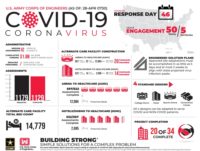COVID-19 and Construction
Army Corps Set to Deliver 28 More COVID-19 Alternate Care Facilities
Agency and FEMA create space for emergency beds even as some governors scale back needs

Contractors working for the U.S. Army Corps of Engineers are now building 28 alternate care facilities for COVID-19 and other patients in convention centers, hotels and arenas. That's 11 more than were under construction just 10 days ago. Facilities under way and completed are in 41 states by either the USACE or local authorities.
Among the new facilities in that group of 28 is a hotel in Florissant, Mo., the Walter E. Washington Convention Center in Washington, D.C., the Miami Convention Center and the Colorado Convention Center in Denver.
"We want to set the condition that hospital bed space is not a factor," said Lt. General Todd E. Semonite, chief of engineers and commanding Corps general at an April 17 press conference with reporters at the Pentagon.
[For ENR’s latest coverage of the impacts of the COVID-19 pandemic, click here]
Almost all of the 28 facilities are set to finish construction by the end of the month, others—including New York's Javits Center, Chicago's McCormick Place and Detroit's TCF Center—are completed and already have patients.
Gen. Semonite said the currently lower projections for coronavirus infection rates in many states have given the Corps more time to prepare some of these facilities. Predictions of need are based on the University of Washington's Institute for Health Metrics and Evaluation (IHME) hospitalization model created and used by Vice President Mike Pence's Coronavirus Task Force.
"The virus is getting a vote," Pence said, "We have more time since we haven’t seen the big spike that was predicted. What we are seeing is, the curve is elongated. We thought it would go up and come back down." Instead, he said they are seeing the curve "stretch all the way out, perhaps as far as June."
Semonite stressed that other Corps work, such as managing the nation's waterways, including construction on locks and dams, continues independent of the alternate care facility work.
These Federal Emergency Management Agency-funded facilities do not affect the budget for waterways work or other projects such as the U.S.-Mexico border wall being constructed in several states.
"The cost is split 75% federal, 25% local, and the amount the local entities contribute depends on whether or not the locality is named a disaster area," Semonite said. "FEMA pays the federal cost. Money has not been an issue with FEMA when it comes to saving lives, I think that’s the right call."
Michigan Gov. Gretchen Whitmer [D] on April 17 became the first governor to formally request that the cost share requirements for the state be lifted in a letter to FEMA Administrator Peter Gaynor.
The Corps previously published the FEMA contract value for Detroit's TCF Center conversion as $11.5 million. In her letter, Whitmer said Michigan has spent more than $234 million associated with operation of the State Emergency Operations Center and activities necessary to prevent, contain and mitigate COVID-19 pandemic effects.
Number of Pending Builds Decreases
The number of pending builds for alternate care facilities the Corps is considering has dropped to seven, with a total of 883 beds. Work completed or under way will deliver 15,873 beds. Semonite said site assessments are ongoing and his team has recently looked at facilities in states where the COVID-19 infection rate or "curve" is further behind the rest of the nation, such as Alaska, Hawaii and Guam.
"We’re seeing in some of the remote locations that there’s a little more time," he said. "Other ones, you’d be surprised. You might have one state showing [the curve going down] by the end of April, then two states away their curve is a little bit different. We don’t know. We’re looking at all of these to get the best advice we can, but we want to try to figure out those curves.”
Semonite added that he and his team look at every individual site. They do not make decisions based on the entire U.S. or national trends, and do a "deep dive" for each.
"I have the modelers go in, and we look at city X," he said. Figuring out contractors and the facility design are a lot easier on a case-by-case basis "than trying to figure out the whole [nation]," he added.
Semonite noted that the Corps continues to receive "overwhelming" support from federal officials and the Trump Administration.
"I don’t know when this is going to be over, but all of us are very, very focused, and we want to set the conditions so that hospital bed space is not a factor," he said.




